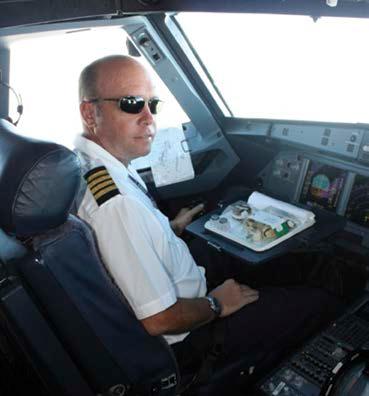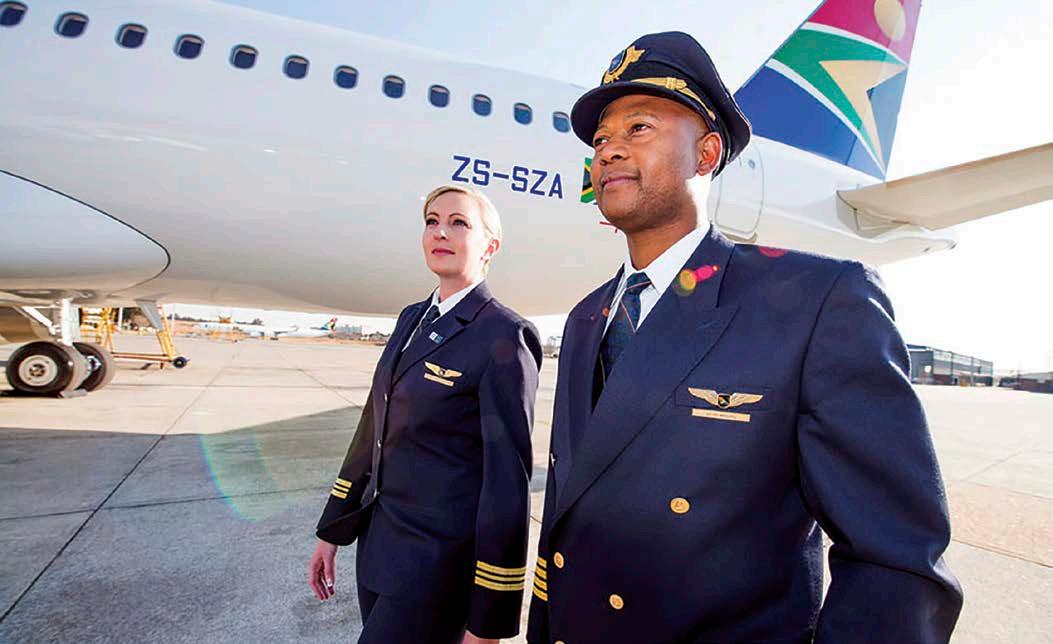
7 minute read
Airline Ops - Mike Gough
STAYING THE COURSE
In my accidental role of career advisor, I regularly wax lyrical about the subliminal joys of piloting aircraft for the rest of one’s days.
Advertisement
THESE are conversations I frequently have at Lanseria with prospective pilots-to-be and their parents.
Are we, globally, a happy bunch of airline pilots? With all these massive shortages we must be positively walking on sunshine in anticipation of the world’s love for us being shown in those showers of money that must surely be about to happen.
I do believe the current uncertainty of some routes and fleet plans to park some aircraft for a while is pretty much temporary while we shake off this latest flu bug,

Once this virus is put to rest there should be an explosion of job opportunities.
although it does show what a fragile industry we are.
If I think back to when I set out on the lengthy journey of acquiring experience without running out of luck, I wonder now if I would have the energy to do it all again. That’s something I also declare during those career counselling sessions, that I definitely do.
Apparently, 71% of surveyed airline pilots feel the same. If we could go back to our student pilot days, we’d do it all again and forego any other career option. Recently, Goose Recruitment conducted a survey of airline pilots’ state of mind, in an
attempt to look a little more scientifically at what makes us tick, and what our plans and expectations are. They surveyed around 1300 active airline pilots from around the globe. The results were published by Flight Global recently and makes for interesting reading.
The survey kicked off with attempting to establish what our priorities are. This is obviously in line with what a recruiting agency would like to establish, as tailoring opportunities in line with what we would like to see would result in being more effective in terms of job matchings and placements.
Overall, work-life balance came first for all respondents. One definition of workbalance goes along the lines of: ‘the lack of opposition between work and other life roles. It is the state of equilibrium in which the demands of personal life, professional life and family life are equal.’ This was followed next by salary, company culture, training and lastly, career development.
Interestingly, broken down into gender demographics, female pilots placed training third after salary, while males placed training as their absolute last priority. One could read into this that the ladies are aware of the expectations to perform well in this ‘male workplace’, and thus consider quality training a higher priority than males and would thus assess job opportunities differently.
The next category that was assessed was stress. What is our biggest source of stress in this career?
Unsurprisingly, (for me, anyway, as it resonates significantly) the biggest issue we have is with management. 41% of us consider
this to be the biggest single source of stress, while safety was cited by 12%, passengers scored 5%, rostering and rotations 29%, and lastly commuting to and from work was the biggest issue for 13%.
As this is a global perspective, the concept of management being our biggest single issue needs a little investigation. It follows, if this is our major source of onthe-job stress, that it is also our biggest threat in terms of safety. It is possible that management, being generally non-pilot based, and having priorities in completely different areas to us, would take decisions, implement policies, procedures and processes that we, at the ‘coal face’ could frequently take exception to.
I regularly build up a head of steam when considering some of the completely stupid decisions that have been taken by some areas of management. However, our situation here in South Africa certainly has its own special nuances to deal with, and with my particular employer now commencing massive retrenchments, the uncertainty takes stress levels to a different flight level. But I digress.
Another interesting aspect is that we are insecure little beings. Despite having a ‘good’ job with a solid operator, with decent pay and rostering patterns, 58% of female pilots and 52% of males are constantly concerned about their job security. Possibly also associated with a real understanding of how quickly things can change globally for the entire airline industry.
The survey also took a good look at mental health and how we feel about this super-sensitive topic. 59% of us globally feel our employers don’t give a hoot about our personal well-being and this figure climbs to 71% for the middle east airlines. I would definitely agree with this one but have not specifically dwelled on the topic too much, as I probably suffer from the ‘tough-guy’ mentality that we will just get on with the job, and not stop to smell the daisies too often, in terms of deep personal introspection.
It is also quite possible that there is just a lack of communication about this, due to any unintended fall-out that may occur. I think if I plonked myself in my fleet captain’s office and said I want to discuss my mental health I would raise some huge red flags and might be off for some unwanted medical examinations. The very thought of having to deal with anything along those lines with our CAA’s medical section would keep everyone far away from any form of self-reporting. Most airline pilots would do it all again, if given the chance.
Assuming we are able to keep all our faculties serviceable for the long run, how many of us are planning to retire at the mandatory maximum age? This is generally at age 65, with a few exceptions, higher and lower.
The figure returned in the survey was that only 71% of us are prepared to fly to mandatory retirement age. The significance of this is that this loss of 29% is generally not factored into world-wide pilot numbers, which makes us around one-third worse off than anticipated, and that’s not a pretty picture.
I cannot find a definitive percentage of how many people statistically lose their medical certificates during their career, although generally in the crew forecasts that Boeing and Airbus regularly produce, this is factored in. However, our lack of enthusiasm as we approach retirement age to go all the way will be another constraint on available crew.
Returning to the question of would we do it all again? As mentioned previously, overall, 71% of us would, while regionally 96% in South America would, 81% for the USA but down to 67% for Europe – probably as a result of super tight rosters, fatiguing flight time limitations and extremely busy airspace.
When asked about our perceived threat of automation taking over the cockpits of the future, 40% expressed concern that single pilot, and pilotless cockpits of the future would impact job security.
This percentage pretty much ties up with the age demographic of responders under 35 years old. Us 50 plus types are not unduly weighed down with this futuristic threat as even pilotless cockpit prototypes are yet to fly and are not anywhere close to reality. I plan on watching these developments from my retirement spot on the beach.

Statistics and number crunching hardly excites me, but this basic set of data does give a little insight into what makes us tick in the job market.
As I find myself entering the job seeking market for the first time in 23 years due to the implosion at my current employer, the prospect of such a search seems strangely relaxed. Possibly because my personal financial obligations are well under control and my flight school, epically busy as ever, has a squadron of old Cessna 172s that are in huge demand around the world at present. The prospect of huge upheaval and relocation is what seems the most daunting, as well as the separation from my close family and friends.
I am most looking forward to the massive explosion of hiring once that virus has been beaten into submission, and the opportunities that currently are temporarily on hold, to return with a vengeance.
Here’s to an interesting next few months in the global airline job market.

Work-life balance rated as the most important aspect for those surveyed.










